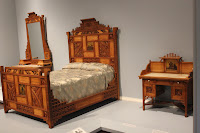One of the biggest setbacks for a beginners in art, craft, or woodworking for many is that their abilities don't match their expectations, for most this isn't a matter of talent, but a lack of experience in the technical techniques that is needed to achieve their goals. This happened to me the first time I tried oil painting, what I saw in my head was a long way from what I painted on the canvas and it wasn't that I didn't have the talent or the skills I just lacked the knowledge of the process.
I'm a professional woodworker and the first thing I learned was the basics then I started learning more advance techniques then with confidence I started to experiment, a lot, and with that I developed my own style. When I tried to start oil painting I skipped learning the basics and was so disappointed in my results that ended up just putting it all away with the feeling that painting just wasn't for me.
Well now, I am a student at Wilmington College as a art major, and one of the things that I have noticed is that many of these younger student go though the same thing that I did with oil painting, with some of the different medias they are trying working in, they forget that they are there to learn the technique and instead they get wrapped up into the expectation of their finished pieces of work, which is easy to do. They need to remember that these beginning pieces are just a byproducts of learning the techniques of the process. Many just need to take some time to try do the work a different way and to feel the freedom to experiment while not being afraid make mistakes, however it being a class, the emphases is always on the finish piece, and not the how it got there or if we were willing to take chances along the way. What I noticed is many of the students keep doing the techniques that they felt comfortable with, so they didn't risk any mistakes and while there pieces came out good, some could be been much better, but as with all students we always have that grade to worry about and our senior portfolios to fill.
I think for beginners its important just to do a lot of work, do a large body of work that will help to develop your style and teach you more then any class or book. If your a beginning artist, crafter, or woodworker learn the basics then color out side the box when you get the chance, take them chances, experiment with your work, yeah you will make mistakes and sometime you will do work that is total junk, but them are the ones you are going to learn the most from, but more than anything else have fun with it, don't take your failures to serous and when one does go bad look at it to see what can I learn from it, that failure is a great learning opportunity and then go try something else.


















